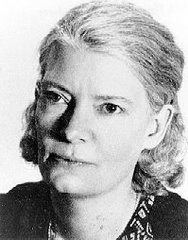Rae asked me in a comment on the Psalm for women (see post below this one) I posted recently about which of the women mentioned in the prayer most inspired me. Thanks for asking; I realized after the fact I probably should have mentioned that before asking all of you which Christian/Catholic women inspire you the most!
I think I have a hard time choosing one of the women listed as “most” inspirational, as at various times in my life I’ve felt a connection with most of these women. I’ve loved reading about Teresa of Avila, St. Therese, Sarah (my namesake), as well as Ruth, St. Catherine and St. Clare. There are women not mentioned in the prayer that I’d add to a list of women I feel inspired by, including Judith, St. Gianna, St. Elizabeth Ann Seton and others.
Each of these women could have (and deserve) their own post! But for today I’m choosing a woman who has not been recognized as a canonized saint, but who for me, has represented what it means to view our faith as a living struggle and sacrifice, and to live the Beatitudes on a daily basis in the 20th (or 21st) century. That woman is Dorothy Day.

Dorothy Day (born 1897 – died 1980) lived through some of the most horrific events of the last century including both world wars, the threat of nuclear war, the holocaust, the depression, the legalization of abortion, and the breakdown of the family.
She began her life as a radical socialist journalist living a bohemian lifestyle in New York. She was a post-abortive woman. She had a child outside of wedlock with a man who left her after she decided to (1) enter the Catholic Church and (2) baptize her daughter into the faith. She lived as wildly and recklessly as some of the most famous saints before their conversions (including St. Augustine and St. Ignatius Loyola).
But she experienced a profound conversion of heart which led her to the Church, and which led her to devote the rest of her life to the poor, the voiceless, and to the peace of Christ. Dorothy Day sought to live the Beatitudes each day of her life. Mother Teresa had this to say to Dorothy on her 75th birthday:
“So much love – so much sacrifice- all for Him alone. You have been such a beautiful branch on the Vine, Jesus, and allowed His Father, the Vinedresser, to prune you so often and so much. You have accepted all with great love.”
Many of the people in today’s Catholic “progressive” movement love to hold up Dorothy Day as an example of working for social change/justice as a way of living our faith. They are right to do so, for that is exactly what she said and did. Yet many of these same people are often surprised to find that she was also a faithful daughter of the Church. Dorothy did not call for the dismantling of the Church hierarchy, nor was she lax about the need for, and frequent reception of the Sacraments. Dorothy Day prayed the Rosary daily, went to daily Mass, and to confession weekly. She spent time in Adoration of the Blessed Sacrament daily.
Dorothy called what she preached a “revolution of the heart”, and believed that every Catholic, nourished by the Eucharist, and prayer and the devotions of the Church, could live with this kind of attitude. She said, “There is nothing so radical, so subversive, as Christianity.”However, as radical as she was, she often described herself as a devout and obedient daughter of “Holy Mother Church.”
I have read a lot of her writings over the years, and I’d love to share with you now a few of the ones I find especially touching, challenging, inspiring, etc. I hope you will find them to be as well.
“It is because we forget the humanity of Christ – present with us today in the Blessed Sacrament just as truly as when he walked with His apostles through the cornfields that Sunday long ago – that we have ignored the material claims of our fellow man during this capitalistic, industrialist era. We have allowed our brothers and sisters, our fellow members in the Mystical Body to be degraded, to endure slavery to a machine, to live in rat-infested holes. This ignoring of the material body of our humanity which Christ ennobled when He took flesh, gives rise to the aversion for religion evidenced by many…”
– 1935
“We must practice the presence of God. He said that when two or three are gathered together, there He is in the midst of them. He is with us in our kitchens, at our tables, in our breadlines, with our visitors, on our farms.
When we pray for out material needs, it brings us closer to His humanity. He, too, needed food and shelter. He, too, warmed His hands at a fire and lay down in a boat to sleep. When we have spiritual reading at meals, when we pray the Rosary at night, when we have study groups, forums…Christ is there with us.
What we do is very little. But it is like the little boy with a few loaves and fishes. Christ took that little and increased it. He will do the rest. What we do is so little we may seem to be constantly failing. But so did He fail. He met with apparent failure on the Cross. But unless the seed fall into the Earth and die, there is no harvest. And why must we see results? Our work is to sow. Another generation will be reaping the harvest.” — 1940
“A great wave of gratitude to Holy Mother Church swept over me as I thought of the ministrations of these priests. At nine there had been a colorful and solemn and most happy occasion of all the little children of the parish making their first Holy Communion. And at ten this Mass for the dead!
All the great moments of life as here clothed in grandeur, recognition of man’s dignity, his worth in the sight of God who loved him so much as to die for him…St. Therese called her first Holy Communion, “a kiss of love, a fusion.” And now a Requiem Mass, which brought comfort to the afflicted, a sense of triumph. Death swallowed up in victory…
I thought too of those who attack the Church which so recognized our dignity and brought us such gifts…who attacked the Church not knowing her, and prayed for them.
We know that through Her priests we receive our rebirth in Christ, our communions, our healings of soul and body. She witnesses our marriages, our helps us to die, and our priests are ordained for these great and noble duties of bringing to us the Sacraments, the means of grace which enable us to begin to truly live.” – 1954
Before I get too carried away in my love for DD, I’ll stop posting here! If you’re interested in reading more about her, here are a few good places to start:
Love is the Measure: A Biography of Dorothy Day by Jim Forest
The Long Loneliness: An Autobiography by Dorothy Day
Praying in the Presence of Our Lord with Dorothy Day compiled by David Scott. (This is the book of short reflections from which all of the above quoted passages came.)
Holy Simplicity: The Little Way of Mother Teresa, Dorothy Day, and Therese of Lisieux by Joen Schorn.











